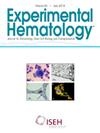利用基因编辑技术的潜力,克服目前car-t细胞治疗t细胞恶性肿瘤的瓶颈。
IF 2.1
4区 医学
Q2 HEMATOLOGY
引用次数: 0
摘要
t细胞恶性肿瘤(tcm)包括多种血液学癌症,其特征是复杂的生物学和侵袭性。在对标准疗法反应不佳的肿瘤学中,中药治疗仍然是一个关键的未满足需求。嵌合抗原受体(CAR)-T细胞疗法是最成功的免疫疗法之一,它已经彻底改变了癌症治疗,各种被批准的CD19 b细胞恶性肿瘤和多发性骨髓瘤的产品都证明了这一点。然而,由于一些独特的障碍,如CAR-T细胞自相残杀的风险,产品被恶性细胞污染,以及严重的t细胞发育不全,将这种治疗方法转化为中药并不是特别成功。此外,无论治疗的癌症类型如何,CAR-T细胞疗法也可能呈现出一些复杂性和潜在的副作用,例如繁琐和昂贵的制造过程、体内功能受损、细胞因子释放综合征(CRS)、神经毒性和CAR-T细胞的白血病转化。最近基因编辑技术的突破性进展和精确基因编辑工具的发展,如CRISPR/Cas9系统及其衍生物,为克服上述瓶颈开辟了一条新途径,并为中医CAR-T细胞治疗铺平了道路。这篇综述揭示了基因编辑如何被纳入CAR-T细胞治疗中,以解决当前的障碍,提高治疗效果,并提高CAR-T细胞治疗在中医中的安全性。还讨论了正在进行/进行的临床试验,以提供对中草药基因组编辑CAR-T细胞治疗的发展前景的全面看法。本文章由计算机程序翻译,如有差异,请以英文原文为准。
Harnessing the potential of gene-editing technology to overcome the current bottlenecks of CAR-T cell therapy in T-cell malignancies
T-cell malignancies (TCMs) include a diverse spectrum of hematologic cancers marked by complex biology and aggressive nature. Treating TCMs remains a critical unmet need in oncology with poor response to standard therapies. Chimeric antigen receptor (CAR)–T cell therapy is one of the most successful types of immunotherapy that has revolutionized cancer treatment, as evidenced by various approved products for CD19 B-cell malignancies and multiple myeloma. Nonetheless, due to some unique hurdles, such as the risk of CAR-T cell fratricide, product contamination with malignant cells, and severe T-cell aplasia, the translation of this treatment approach to TCMs has not been particularly successful. Moreover, irrespective of the type of treated cancer, CAR-T cell therapy can also present some complexities and potential side effects, such as cumbersome and costly manufacturing processes, impaired in vivo function, cytokine release syndrome (CRS), neurotoxicity, and leukemic transformation of CAR-T cells. Recent groundbreaking advances in gene-editing technology and the evolution of precise gene-editing tools such as the CRISPR/Cas9 system and its derivatives have opened a new way to overcoming the mentioned bottlenecks and paving the way for CAR-T cell therapy in TCMs. This review sheds light on how gene editing is being incorporated into CAR-T cell therapy to address current hurdles, enhance therapeutic efficacy, and improve the safety profile of CAR-T cell therapy in TCMs. Ongoing/conducted clinical trials are also discussed to provide a comprehensive view of the evolving landscape of genome-edited CAR-T cell therapy for TCMs.
求助全文
通过发布文献求助,成功后即可免费获取论文全文。
去求助
来源期刊

Experimental hematology
医学-血液学
CiteScore
5.30
自引率
0.00%
发文量
84
审稿时长
58 days
期刊介绍:
Experimental Hematology publishes new findings, methodologies, reviews and perspectives in all areas of hematology and immune cell formation on a monthly basis that may include Special Issues on particular topics of current interest. The overall goal is to report new insights into how normal blood cells are produced, how their production is normally regulated, mechanisms that contribute to hematological diseases and new approaches to their treatment. Specific topics may include relevant developmental and aging processes, stem cell biology, analyses of intrinsic and extrinsic regulatory mechanisms, in vitro behavior of primary cells, clonal tracking, molecular and omics analyses, metabolism, epigenetics, bioengineering approaches, studies in model organisms, novel clinical observations, transplantation biology and new therapeutic avenues.
 求助内容:
求助内容: 应助结果提醒方式:
应助结果提醒方式:


